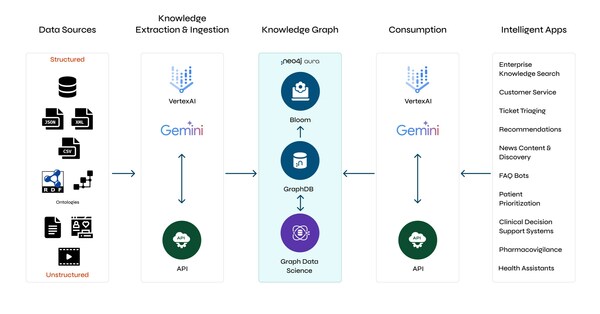New native integrations combined with Neo4j knowledge graphs speed GenAI development and improve deployment success rates
SAN MATEO, Calif., April 9, 2024 /PRNewswire/ -- Neo4j®, the world's leading graph database and analytics company, announced new native integrations with Google Cloud that dramatically speed up Generative AI application development and deployment across several crucial stages. The results solve a problem for enterprises that struggle with complexity and hallucinations when building and deploying successful GenAI applications requiring real-time, contextually rich data and accurate, explainable results. The integrations are available now.

Knowledge graphs capture relationships between entities, ground LLMs in facts, and enable LLMs to reason, infer, and retrieve relevant information accurately and effectively. According to Gartner®, "Data and analytics leaders must leverage the power of large language models (LLMs) with the robustness of knowledge graphs for fault-tolerant AI applications," in Gartner's November 2023 report AI Design Patterns for Knowledge Graphs and Generative AI.
Retrieval Augmented Generation (RAG) is the technique by which LLMs access external datasets. Combining knowledge graphs with RAG, known as GraphRAG, ensures that GenAI outcomes are accurate, explainable, and transparent, including with real-time data.
GraphRAG with Google Cloud: capabilities and benefits
Developers can easily apply GraphRAG techniques with knowledge graphs to ground LLMs for accuracy, context, and explainability, enhancing GenAI innovation. Specifically, they can:
A history of innovation: additional partnership milestones
Regulated customers will be able to meet strict data residency, security, and regulatory requirements in Google Distribution Cloud (GDC) Hosted, which became generally available in March. GDC is an air-gapped private cloud infrastructure and edge environment designed specifically for public sector organizations and regulated enterprises. Neo4j is the preferred launch partner for GDC to provide Graph Database and Analytics capabilities.
Customers can also run in-memory graph analysis of complex hidden data patterns using Neo4j's catalog of 70+ graph data science functions directly on BigQuery data and from BigQuery SQL using Apache Spark Stored Procedures.
In addition, Neo4j this month won Google Cloud's Technology Partner of the Year in the Data Management category for the second year in a row. Neo4j in 2023 was the only native graph vendor to launch native product integrations with GenAI features in Google Cloud Vertex AI platform. Neo4j launched its strategic partnership with Google Cloud in 2019. Neo4j also integrated native vector capabilities into its core graph database last year, enabling it to serve as long-term memory for LLMs.
Supporting quotes
Jeff Dalgliesh, Chief Technology Officer, Data²
"Data² uses generative AI and knowledge graphs to enable organizations to maximize the potential of their data. Today's announcement of Neo4j's new native integrations with Google Cloud, particularly the ability to enhance GenAI applications with Neo4j knowledge graphs, marks an exciting step forward for the industry. With Neo4j's GraphRAG approach and Google Cloud's robust infrastructure, we will be able to deliver even more powerful, explainable AI insights to our clients, helping them make critical decisions with confidence and speed."
Moheesh Raj, Senior Engineering Manager, Dun & Bradstreet
"At Dun & Bradstreet, we're committed to helping companies leverage data and analytical insights to take more intelligent actions that deliver a competitive edge. Today's announcement opens up exciting new possibilities for us to further streamline and accelerate our compliance services, setting a new standard for data-driven due diligence in the industry."
Ritika Suri, Director of Technology Partnerships, Google Cloud
"Generative AI can significantly increase the value customers get from critical business data. By utilizing Google Cloud's Gemini models and Vertex AI, Neo4j can increase the speed and accuracy of generative AI application development."
Sudhir Hasbe, Chief Product Officer, Neo4j
"GraphRAG with Neo4j and Google Cloud enables enterprises to move from GenAI development to deployment much faster and see value from their production use cases. Our latest milestone combines the power of graph technology, GenAI, and cloud computing excellence, enabling enterprises to achieve better results faster from their connected data, and innovate with GenAI."
These capabilities are available now. For more information, read our blog post.
GARTNER is a registered trademark and service mark of Gartner, Inc. and/or its affiliates in the U.S. and internationally and is used herein with permission. All rights reserved.
About Neo4j
Neo4j, the Graph Database & Analytics leader, helps organizations find hidden relationships and patterns across billions of data connections deeply, easily and quickly. Customers leverage the structure of their connected data to reveal new ways of solving their most pressing business problems, from fraud detection, customer 360, knowledge graphs, supply chain, personalization, IoT, network management, and more – even as their data grows. Neo4j's full graph stack delivers powerful native graph storage with native vector search capability, data science, advanced analytics, and visualization, with enterprise-grade security controls, scalable architecture and ACID compliance. Neo4j's dynamic open-source community brings together over 250,000 developers, data scientists, and architects across hundreds of Fortune 500 companies, government agencies and NGOs. Visit neo4j.com.
Contact:
pr@neo4j.com
neo4j.com/pr
©2024 Neo4j, Inc., Neo Technology®, Neo4j®, Cypher®, Neo4j Bloom™, Neo4j Graph Data Science Library™, Neo4j® Aura™, and Neo4j® AuraDB™ are registered trademarks or a trademark of Neo4j, Inc. All other marks are owned by their respective companies.